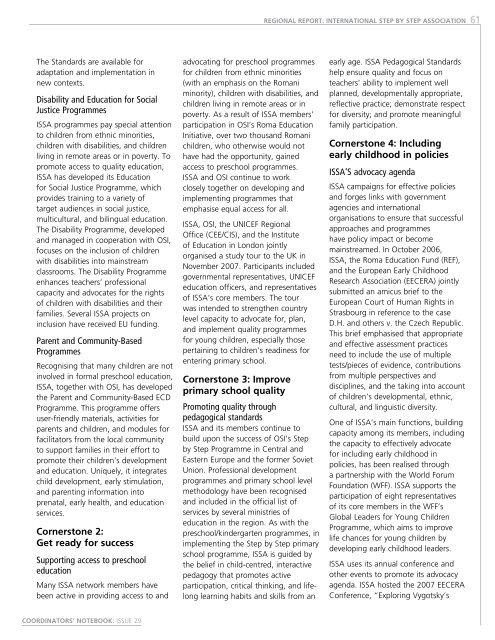A global call to action for early childhood
A global call to action for early childhood
A global call to action for early childhood
You also want an ePaper? Increase the reach of your titles
YUMPU automatically turns print PDFs into web optimized ePapers that Google loves.
REGIONAL REPORT: International Step by Step Association<br />
61<br />
The Standards are available <strong>for</strong><br />
adaptation and implementation in<br />
new contexts.<br />
Disability and Education <strong>for</strong> Social<br />
Justice Programmes<br />
ISSA programmes pay special attention<br />
<strong>to</strong> children from ethnic minorities,<br />
children with disabilities, and children<br />
living in remote areas or in poverty. To<br />
promote access <strong>to</strong> quality education,<br />
ISSA has developed its Education<br />
<strong>for</strong> Social Justice Programme, which<br />
provides training <strong>to</strong> a variety of<br />
target audiences in social justice,<br />
multicultural, and bilingual education.<br />
The Disability Programme, developed<br />
and managed in cooperation with OSI,<br />
focuses on the inclusion of children<br />
with disabilities in<strong>to</strong> mainstream<br />
classrooms. The Disability Programme<br />
enhances teachers’ professional<br />
capacity and advocates <strong>for</strong> the rights<br />
of children with disabilities and their<br />
families. Several ISSA projects on<br />
inclusion have received EU funding.<br />
Parent and Community-Based<br />
Programmes<br />
Recognising that many children are not<br />
involved in <strong>for</strong>mal preschool education,<br />
ISSA, <strong>to</strong>gether with OSI, has developed<br />
the Parent and Community-Based ECD<br />
Programme. This programme offers<br />
user-friendly materials, activities <strong>for</strong><br />
parents and children, and modules <strong>for</strong><br />
facilita<strong>to</strong>rs from the local community<br />
<strong>to</strong> support families in their ef<strong>for</strong>t <strong>to</strong><br />
promote their children’s development<br />
and education. Uniquely, it integrates<br />
child development, <strong>early</strong> stimulation,<br />
and parenting in<strong>for</strong>mation in<strong>to</strong><br />
prenatal, <strong>early</strong> health, and education<br />
services.<br />
Corners<strong>to</strong>ne 2:<br />
Get ready <strong>for</strong> success<br />
Supporting access <strong>to</strong> preschool<br />
education<br />
Many ISSA network members have<br />
been active in providing access <strong>to</strong> and<br />
advocating <strong>for</strong> preschool programmes<br />
<strong>for</strong> children from ethnic minorities<br />
(with an emphasis on the Romani<br />
minority), children with disabilities, and<br />
children living in remote areas or in<br />
poverty. As a result of ISSA members’<br />
participation in OSI’s Roma Education<br />
Initiative, over two thousand Romani<br />
children, who otherwise would not<br />
have had the opportunity, gained<br />
access <strong>to</strong> preschool programmes.<br />
ISSA and OSI continue <strong>to</strong> work<br />
closely <strong>to</strong>gether on developing and<br />
implementing programmes that<br />
emphasise equal access <strong>for</strong> all.<br />
ISSA, OSI, the UNICEF Regional<br />
Office (CEE/CIS), and the Institute<br />
of Education in London jointly<br />
organised a study <strong>to</strong>ur <strong>to</strong> the UK in<br />
November 2007. Participants included<br />
governmental representatives, UNICEF<br />
education officers, and representatives<br />
of ISSA’s core members. The <strong>to</strong>ur<br />
was intended <strong>to</strong> strengthen country<br />
level capacity <strong>to</strong> advocate <strong>for</strong>, plan,<br />
and implement quality programmes<br />
<strong>for</strong> young children, especially those<br />
pertaining <strong>to</strong> children’s readiness <strong>for</strong><br />
entering primary school.<br />
Corners<strong>to</strong>ne 3: Improve<br />
primary school quality<br />
Promoting quality through<br />
pedagogical standards<br />
ISSA and its members continue <strong>to</strong><br />
build upon the success of OSI’s Step<br />
by Step Programme in Central and<br />
Eastern Europe and the <strong>for</strong>mer Soviet<br />
Union. Professional development<br />
programmes and primary school level<br />
methodology have been recognised<br />
and included in the official list of<br />
services by several ministries of<br />
education in the region. As with the<br />
preschool/kindergarten programmes, in<br />
implementing the Step by Step primary<br />
school programme, ISSA is guided by<br />
the belief in child-centred, interactive<br />
pedagogy that promotes active<br />
participation, critical thinking, and lifelong<br />
learning habits and skills from an<br />
<strong>early</strong> age. ISSA Pedagogical Standards<br />
help ensure quality and focus on<br />
teachers’ ability <strong>to</strong> implement well<br />
planned, developmentally appropriate,<br />
reflective practice; demonstrate respect<br />
<strong>for</strong> diversity; and promote meaningful<br />
family participation.<br />
Corners<strong>to</strong>ne 4: Including<br />
<strong>early</strong> <strong>childhood</strong> in policies<br />
ISSA’S advocacy agenda<br />
ISSA campaigns <strong>for</strong> effective policies<br />
and <strong>for</strong>ges links with government<br />
agencies and international<br />
organisations <strong>to</strong> ensure that successful<br />
approaches and programmes<br />
have policy impact or become<br />
mainstreamed. In Oc<strong>to</strong>ber 2006,<br />
ISSA, the Roma Education Fund (REF),<br />
and the European Early Childhood<br />
Research Association (EECERA) jointly<br />
submitted an amicus brief <strong>to</strong> the<br />
European Court of Human Rights in<br />
Strasbourg in reference <strong>to</strong> the case<br />
D.H. and others v. the Czech Republic.<br />
This brief emphasised that appropriate<br />
and effective assessment practices<br />
need <strong>to</strong> include the use of multiple<br />
tests/pieces of evidence, contributions<br />
from multiple perspectives and<br />
disciplines, and the taking in<strong>to</strong> account<br />
of children’s developmental, ethnic,<br />
cultural, and linguistic diversity.<br />
One of ISSA’s main functions, building<br />
capacity among its members, including<br />
the capacity <strong>to</strong> effectively advocate<br />
<strong>for</strong> including <strong>early</strong> <strong>childhood</strong> in<br />
policies, has been realised through<br />
a partnership with the World Forum<br />
Foundation (WFF). ISSA supports the<br />
participation of eight representatives<br />
of its core members in the WFF’s<br />
Global Leaders <strong>for</strong> Young Children<br />
Programme, which aims <strong>to</strong> improve<br />
life chances <strong>for</strong> young children by<br />
developing <strong>early</strong> <strong>childhood</strong> leaders.<br />
ISSA uses its annual conference and<br />
other events <strong>to</strong> promote its advocacy<br />
agenda. ISSA hosted the 2007 EECERA<br />
Conference, “Exploring Vygotsky’s<br />
COORDINATORS’ NOTEBOOK: ISSUE 29
















